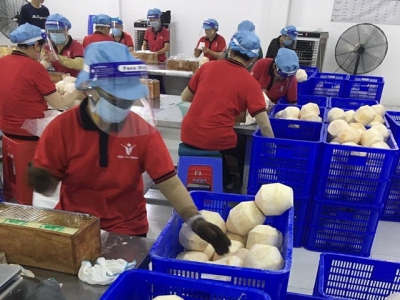Restoring production, connecting circulation to save farmers and businesses

Many solutions are continuing to be implemented with the active participation of ministries, sectors, localities and enterprises in order to quickly restore the chain of consumption of agricultural products between the Mekong Delta and Ho Chi Minh City.
Enterprises operating "3 on the spot" models can only maintain about 30-40% of employees, so productivity drops sharply, affecting the consumption of agricultural products.
At the online seminar "Connecting supply - demand of agriculture - fisheries between provinces and cities in the Mekong Delta and Ho Chi Minh City", representatives of provinces and cities in the Mekong Delta raised a series of problems arising in production, circulation, connection and consumption of agricultural products during the Covid-19 pandemic.
According to information provided by localities, there is still a large amount of agricultural products waiting to be harvested or facing difficulties in output. For example, in Ben Tre, there are 35,000 tons of fruit trees, 300 million coconuts, 140 million industrial coconuts and a large amount of seafood such as shrimp, clams and oysters waiting to be harvested. Hau Giang still has 6,000 tons of seafood.
Meanwhile, at the distribution enterprises, there was a shortage of goods.
Ms. Tran Minh Nga, External Affairs Director of MM Mega Market Vietnam Company, said that the MM Mega Market supermarket system is lacking a number of fresh and processed agricultural and aquatic products, as well as dried food.
MM Mega Market has signed contracts to purchase frozen products with food processing factories in the Mekong Delta, but because the business implements the "3 on the spot" and "4 on the spot" models, the productivity dropped sharply.
Frozen goods factories operate below capacity, mainly focusing on meeting outstanding export orders, leading to a shortage of frozen seafood products at supermarkets in the system.
Regarding fresh goods, according to Ms. Nga, the Mekong Delta is a source of agricultural and aquatic products for Ho Chi Minh City and the whole country, but now farmers tend to produce in moderation, not boldly investing in farming, so the amount of fresh food imported is little. Even for dry food, a major supplier of MM Mega Market in the Mekong Delta had a problem and had to suspend production to fight the pandemic, so the supply of goods was interrupted.
In order to restore production, Mr. Nguyen Phuoc Thien, Director of the Department of Agriculture and Rural Development of Dong Thap province, suggested that there should be a consensus on views between provinces to create favorable conditions for businesses from the province to another to harvest, it doesn't take time to get permission from the beginning because agricultural products only need to be harvested half a day or a day late, the quality is reduced.
Many localities have also planned to restore production. As in Can Tho, departments and sectors are actively supporting "3-on-the-spot" production enterprises or guiding some businesses towards opening a road with many destinations (destination in green areas). The vaccination program is also being promoted by the localities to soon bring businesses back to production.
Ms. Le Viet Nga, Deputy Director of the Domestic Market Department - Ministry of Industry and Trade, also said that in the future, the Ministry of Industry and Trade will continue to implement many solutions to support the connection and consumption of goods through various activities. Connecting supply and demand, promoting trade, diversifying distribution forms.
In particular, a virtual exchange will be put into operation to create more promotion and sales channels for businesses in the context of complicated pandemic developments.
Mr. Nguyen Nguyen Phuong, Deputy Director of Ho Chi Minh City Department of Industry and Trade, said that in the future, it is necessary to continue to connect with distribution systems to assess, compare and synthesize market demand and prices to be able to connect purchasing. In addition, Ho Chi Minh City has also allowed e-commerce floors as well as businesses doing business on e-commerce platforms to reopen.
In the near future, shippers will be able to operate across districts in Ho Chi Minh City, creating conditions for people to access goods and solve output for local people. In addition, with mobile sales in the form of combos, if the locality can organize the harvest and packing according to their own specifications, the Department of Industry and Trade of Ho Chi Minh City can coordinate, connect information, and sell products to each residential group.
Ho Chi Minh City is also trying to reorganize the traditional distribution system. After a week of piloting at the Binh Dien wholesale market, the volume of goods increased day by day, if the first day was just over 10 tons, on the night of September 13, it had reached more than 100 tons.
With the experience of successful initial deployment at Binh Dien market, it is possible that Ho Chi Minh City will slowly reopen this gathering point.
Related news
Tools

Phối trộn thức ăn chăn nuôi

Pha dung dịch thủy canh

Định mức cho tôm ăn

Phối trộn phân bón NPK

Xác định tỷ lệ tôm sống

Chuyển đổi đơn vị phân bón

Xác định công suất sục khí

Chuyển đổi đơn vị tôm

Tính diện tích nhà kính

Tính thể tích ao



 China is changing drastically, giving up the "habit"…
China is changing drastically, giving up the "habit"…  Pepper industry makes five recommendations to overcome difficulties…
Pepper industry makes five recommendations to overcome difficulties…